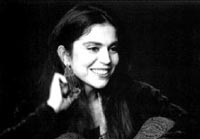In search of the human voice with Savina Yannatou

Greece is known by its poets, the most famous ones being Cavafy, Ritsos, Elytis and Seferis. The last two received the Nobel prize but ever since it was a question about the role of poetry in a world undergoing many changes. If Seferis could still say “once the tourists leave with the boats, they return the shores to the winds”, that has become doubtful in today’s Greek landscape. For there are too many second homes which no longer return nature to the language of the physical elements made up of rocks, winds, colors of deep blue as seen in the sea and sky.
Moreover, Greece has entered the European Union and with it goes the question, what shall create the link between ‘then’ and ‘now’. Elytis did attempt such a bridge over time by translating the poems of Sappho from Ancient Greek into Modern Greek, while his “Axion Esti” cries out the anguish of what took place during Second World War. How then to find as well access to the future, if not merely unknown but burdened by these examples of the past? Still, there is the myth and the many unknowns ahead, so that poetic reflections of these and other myths are like taking measure what man can grasp of reality through language, a language carried above all forth through the human voice.
“Metron” has always been not merely a measure of the gap between two pillars of a Greek temple or the rhythm by which a poem becomes a song, but it is also a measure for the tasks ahead especially since establishing ‘justice’ in society is no easy task. Consequently there is also a measure between expectation and reality when shaping ideas about what lies ahead.
The visionary in poetry is, therefore, the logos of wisdom, a “Sophia” allowing for another kind of mediation between man and other human beings making up together social reality.
An opportunity was given to explore further this relationship between poetry and mythology when poets came together in Athens and named themselves loosely the ‘Touch Stone’ group. They had a first joint performance at the Goethe Institute in 1993 when among others Eugene Van Itterbeek from the poetry house “Seven Sleepers” in Leuven, Belgium joined. He provided a vital link to the European poetry movement.
At that event besides Katerina Anghelaki Rooke there were also participating Chris Roberts and Liana Sakelliou-Schultz from Athens University while the composer Vangelis Katzoulis played his piano pieces Seferis. It is a wide spread tradition in Greece that poets provide the lyrics for famous songs as has been the case with Ritsos and Theodorakis especially during the cultural fight against the military dictatorship in Greece. Touch Stone developed further as Poly Kasda, a Greek artist from Alexandria, discovered the Cretan village Kamilari where the poets came together in 1993 to discuss the link between poetry and mythology.
Out of all these and other interactions, and upon recommendation by Eugene Van Itterbeek, Hatto Fischer was asked by the Flemish Government to organize in Athens during the EU Greek Presidency the Fifth Seminar to continue “Cultural Actions for Europe”. One request by the Flemish government was to underline Europe’s cultural diversity. Consequently this idea to have the singer Savina Yannatou interact with the poets as part of the cultural program of the Fifth Seminar came about.
Savina Yannatou had already when working for the radio collaborated with her sister and writer Sophia Yannatou in order to create imaginary pieces based on Calvino’s text about “Invisible cities”. Around that time, that is 1994, Savina became known through the Sephardic songs of the Jewish people who had been ousted from Spain and who ended up in Thessalonika.
In “Voices of European poets” Savina Yannatou has created another unique, equally experimental piece. In it she demonstrates how language and poetry can go together in search of the ‘human voice’. Technically speaking, she could compose on different tracks simultaneous various forms of expressions: the poet’s voice, her voice, music and vocal sounds. Especially with regards to the latter Savina is incredibly adapt to produce such sounds.
The poets reading pieces of their works are Katerina Anghelaki Rooke (Athens), Liana Sakelliou-Schultz (Athens), Jean Baptiste Marray (Paris), Olympia Karayiorgo (Athens), Hatto Fischer (Berlin/Athens), Anne Born (Oxford), Maja Patajova (Antwerp/Bulgaria), Jose L. Rainer Palazos (Seville), Bruno Kartheuser (German minority in Belgium) and Donatella Bisutti (Milano).
The full version of Savina Yannatou’s piece begins and ends to the sound of the poetess Katerina Anghelaki Rooke using a type writer – in between phonetic spaces are created to let the meanings of the poems stemming from different voices become audible. Images collide and spark off new associations. While Bapiste Marray mourns the loss of life in Paris, Anne Born speaks with her clear English voice about the unicorn. Once Hatto Fischer started his refrain of “da steht ein Stuhl / allein / kroch Rauch herein…” (there stands a chair, alone, crept in smoke….), Savina expressed surprise that the German language could be spoken so softly. The piece is full of surprises and therefore a true dedication to European poets using their voices.
Listen to the audio piece:
« The poetics of life versus the poetics of death by Katerina Anghelaki Rooke (1994) | Poets and Myth of Europe - an evaluation »
